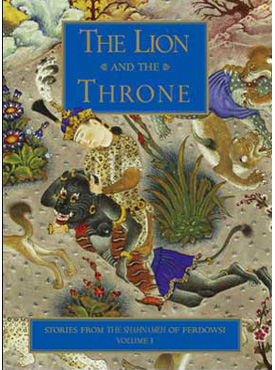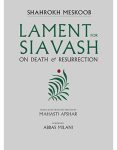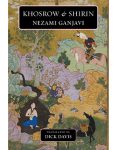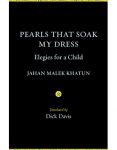About the Book
Among the masterpieces of world literature, perhaps the least familiar to English readers is the Persian book of Kings (Shahnameh, in Persian). This prodigious national epic, composed by the poet Ferdowsi between 980 and 1010, tells the story of ancient Persia, beginning in the mythic time of Creation and continuing forward to the Arab-Islamic invasion in the seventh century. the lion and the throne covers the first third of the shahnameh and will be followed by two volumes to complete the epic. Brilliantly translated and magnificently illustrated, these volumes give English-language readers access to a world of vanished wonders.
The origins of civilization…the notion of kingship…tenderness, a longing for justice, and social order…the first kings felled by foolish pride…demons on the throne…spiritual heroes and their martial virtues…mythical birds…romance and passion—these are some of the threads woven together to form the rich tapestry of ancient Persia. Translator Dick Davis combines his skills as a poet and a Ferdowsi scholar to evoke the metrical music, impact, and nuance of Ferdowsi’s monumental poem.
Breathtaking miniatures from the finest Persian Shahnameh manuscripts of the sixteenth and seventeenth centuries heighten the emotional impact of the text. A short afterword by the eminent art historian Stuart Cary Welch unravels the history behind these paintings.
Reviews
The Shahnameh is the Persian national epic, a poem of more than 40,000 lines completed by the poet Ferdowsi in about the year 1000. Some 30 years ago Yarshater rendered into elegant modern Persian prose the opening narratives of the epic, and now Dick Davis, the foremost translator of Persian literature into English, has translated those tales and added two additional narratives taken directly from the epic poetry. The book also contains a short summary of the entire Shahnameg, an essay by Stuart Cary Welch entitled “Illustrating a Shahnameh,” and other appendixes. The prose rendering is as smooth and polished as Davis’s translations always are. The publishers outdid themselves in producing a beautiful book that is in many ways reminiscent of a medieval Persian manuscript. Illustrated with numerous paintings, details of paintings and cartouches, section headings in gold ink, flowers at chapter heads, decorative borders and many other details, the volume is a rich and evocative example of bookmaking. More a coffee-table book than a scholarly volume, recommended for general readers and undergraduates.
—Choice Magazine
Excerpt
Table of Contents
- Introduction / Vii
- The First Kings / 17
- The Demon-King Zahhak / 31
- The Story Of Feraydun And His Three Sons / 65
- The Story Of Iraj / 73
- The Vengeance Of Manuchehr / 85
- The Tale Of Sam And The Simorgh / 102
- The Tale Of Zal And Rudabeh / 113
- Rostam, The Son Of Zal-Dastan / 149
- The Beginning Of The War Between Iran And Turan / 155
- Rostam And His Horse Rakhsh / 183
- Rostam And Kay Qobad / 189
- Kay Kavus’s War Against The Demons Of Mazanderan / 196
- The Seven Trials Of Rostam / 205
- The King Of Hamaveran, And His Daughter Sudabeh / 231
- The Tale Of Sohrab / 245
THE BIRTH OF ZAL
Sam, the son of Nariman, was the lord of Zabol and the preeminent champion of Iran, but he had no sons, and this was a source of great grief to him. At last a beautiful woman of his entourage became pregnant by him and she gave birth to a handsome son. But although the baby had rosy cheeks and black eyes and a fine face, his hair was as white as snow. His mother was very distressed by this. No one dared go to Sam and say that he had a son whose hair was as white as that of an old man.
Finally the boy’s wet nurse, who was a courageous woman, conquered her fear and went to Sam and said, “My lord, I bring good news. You have a handsome, healthy son as splendid as the sun. And if he has white hair, well, this was your Destiny fated by God. You must rejoice and not grieve about this.”
When he heard the wet nurse’s words, Sam descended from the throne and went to the women’s apartments. He saw the rosy-cheeked, splendid baby whose hair was like an old man’s. He was deeply perturbed and, turning his face to the heavens, said, “O just Lord, what sin have I committed that you have given me a white-haired son? If now the nobles here should ask, ‘What is this baby with black eyes and white hair?’ how am I to answer? How can I lift my head up with such shame in my family? The champions and nobles will laugh at Sam, the son of Nariman, saying that after so long he finally had a son who has white hair. How can I stay in my own country with such a son?” Saying this, he passionately turned his head aside and left the apartments.
THE SIMORGH
A short while later he gave orders that the baby be taken from its mother and carried to the foothills of the Alborz Mountains, where it was to be exposed. The little baby was left on the ground, bereft of its mother’s love, with no comfort or companion, without food or clothes. It gave a cry and began to weep. The Simorgh had a nest on a summit of the Alborz. As she was flying on her search for food, she heard the sound of the crying baby. She flew low and saw the baby lying on the ground, crying and sucking its thumb. She had intended to treat the child as prey, but maternal love stirred in her heart. She reached down with her claws and lifted him up to take him to her own fledglings.
When the Simorgh’s fledglings set eyes on the crying baby, they were astonished; they acted kindly toward him and made much of him.
A voice came from God to the Simorgh, saying, “O king of the birds, nourish and look after this splendid child.” The Simorgh gave the child food and brought him up with her own young.
Many years passed. The child grew up and became a brave, noble youth. Caravans passing that way would occasionally glimpse the mammoth-bodied young man with white hair, as he moved nimbly among the crags and foothills of the mountains. Rumors of the youth passed from mouth to mouth, until the world was full of talk of him and the news reached Sam, the son of Nariman.
SAM’S DREAM
One night Sam was asleep in the inner apartments of his castle. In a dream he saw an Indian warrior, mounted on a galloping horse, who came to him and gave him the good news that his son was alive. Sam started up from sleep and summoned the wise men and priests of his court and told them of his previous night’s dream and said, “What is your opinion of this? Can we believe that a defenseless child could survive the cold of winter and the heat of summer and stay alive until now?”
The priests considered the matter carefully and then reproached the king, saying, “My lord, you have acted ungratefully, despising the gift given to you by God. Consider the beasts of the field, the untamed beasts of the thicket, the birds of the air, and the fish in the sea, and see how loving they are to their offspring. Why did you take his white hair to heart in this way and not consider his innocent body and divine soul? Now it is plain that God has preserved your son, and one whom God preserves cannot be destroyed. You must follow the path of remorse and seek out your son.”
The next night Sam saw in a dream that a young man carrying a banner had appeared at the head of an army in the mountains of India, and that he was accompanied by two learned priests. One of these two came forward and began to speak harshly to him, “O presumptuous, heartless man, had you no shame before God that you exposed on a mountainside the son for whom you had begged God? You despised him for his white hair, but look, your own hair has turned as white as milk. What kind of a father do you call yourself, that a bird has had to bring up your child?”
Sam started up from sleep and immediately made all preparations necessary for a journey, and set off for the Alborz Mountains. He saw a high peak whose summit touched the heavens. On the top of the peak rose the Simorgh’s nest, as tall and strong as a castle, and around it walked a nimble-bodied, noble youth. Sam realized that this was his son. He wanted to climb up to him, but for all his efforts he could not find a way up the mountain. The Simorgh’s nest seemed to be placed as high as the stars themselves. He scattered dust on his head and bowed before God, repenting his former actions, and said, “O just Lord, place a way before my feet so that I can reach my child again.”
THE RETURN OF DASTAN
Sam’s repentance was accepted in the world Creator’s court. The Simorgh looked down and, glimpsing Sam on the mountainside, she realized that this was the father come in search of his son. She went to the youth and said, “O brave young man, until today I have brought you up as if I were your nurse, and I have taught you speech and the ways of virtue. Now it is time for you to return to your own birthplace. Your father has come searching for you. I have named you Dastan (The Trickster) and from now on you will be known by this name.”
Dastan’s eyes filled with tears, and he said,”Have you grown tired of me, that now you are sending me to my father? I have become used to the nests of birds and the high mountain peaks, and I have found comfort in the shade beneath your wings; after God himself, there is no one to whom I am more grateful than you. Why do you want me to return?”
The Simorgh said, “I have not lost my love for you, and I shall always be your kindhearted nurse. But you must return to Zabolestan and there fight and be a brave warrior. Birds’ nests are no longer of any use to you. But take a memento of me: I give you this feather from my own wing. Whenever you are in trouble and need aid, fling the feather into fire, and without delay I shall make haste to help you.
Then the Simorgh lifted Dastan up from the mountain peak and placed him on the ground next to his father. The youth seemed so noble and illustrious that Sam wept to see him; he embraced his son and thanked the Simorgh and begged for forgiveness.
The army flocked about Dastan, rejoicing and praising his mammoth body, his strong arms, and his cypress stature. Then Sam and Dastan and the other warriors who were with them set off in high spirits for Zabolestan. From that day forth, because of his white hair, Dastan was called Zal-e Zar (The Golden Graybeard).
About the Author
About the Translator
Dick Davis brings a unique array of gifts to the challenges of translating Hafez and his contemporaries. In his own right, he is a poet of great technical accomplishment and emotional depth. He is also the foremost English-speaking scholar of medieval Persian poetry now working in the West. Numerous honors testify to his talents. In the U.K., he received the Royal Society of Literature’s Heinemann Award for his second book of poems, Seeing the World, in 1981; his Selected Poems was chosen by both the Sunday Times and the Daily Telegraph as a Book of the Year in 1989; and his collection Belonging was selected as the Poetry Book of the Year by The Economist in 2003. In the U.S., A Kind of Love—the American edition of his Selected Poems—received the Ingram Merrill prize for “excellence in poetry” in 1993. He has received awards for his scholarship from the Arts Council of Great Britain, The British Institute of Persian Studies, and the Guggenheim Foundation, and he is the recipient of grants for his translations from the National Endowment for the Humanities and the National Endowment for the Arts. Twice, in 2000 and 2001, he received the Translation Award of the International Society for Iranian Studies, and in 2001 he received an Encyclopedia Iranica award for “services to Persian poetry.” His translation of Ferdowsi’s Shahnameh: the Persian Book of Kings was chosen as one of the “ten best books of 2006” by the Washington Post.
Davis read English at Cambridge, lived in Iran for eight years (he met and married his Iranian wife Afkham Darbandi there), then completed a PhD in Medieval Persian Literature at the University of Manchester. He has resided for extended periods in both Greece and Italy (his translations include works from Italian), and has taught at both the University of California and at Ohio State University, where he was for nine years Professor of Persian and Chair of the Department of Near Eastern Languages, retiring from that position in 2012. In all, he has published more than twenty books and is a Fellow of the Royal Society of Literature.
Among the qualities that distinguish his poetry and scholarship are exacting technical expertise and wide cultural sympathy—an ability to enter into distant cultural milieus both intellectually and emotionally. In choosing his volume of poems Belonging as a “Book of the Year” for 2006, The Economist praised it as “a profound and beautiful collection” that gave evidence of “a commitment to an ideal of civilized life shared by many cultures.” the Times Literary Supplement has called him “our finest translator of Persian poetry.” In 2009 Mage published a book of Dick Davis’s own poems about Iran: At Home and Far From Home: Poems on Iran and Persian Culture. His book about the Shahnameh, Epic and Sedition was published by Mage in paperback in 2006. His books of translations are: Borrowed Ware: Medieval Persian Epigrams (1998), The Shahnameh (2004); The Legend of Seyavash (2004); Rostam: Tales of Love and War from Persia’s Book of Kings (2007); Vis and Ramin (2008); Faces of Love: Hafez and the Poets of Shiraz (2012).









